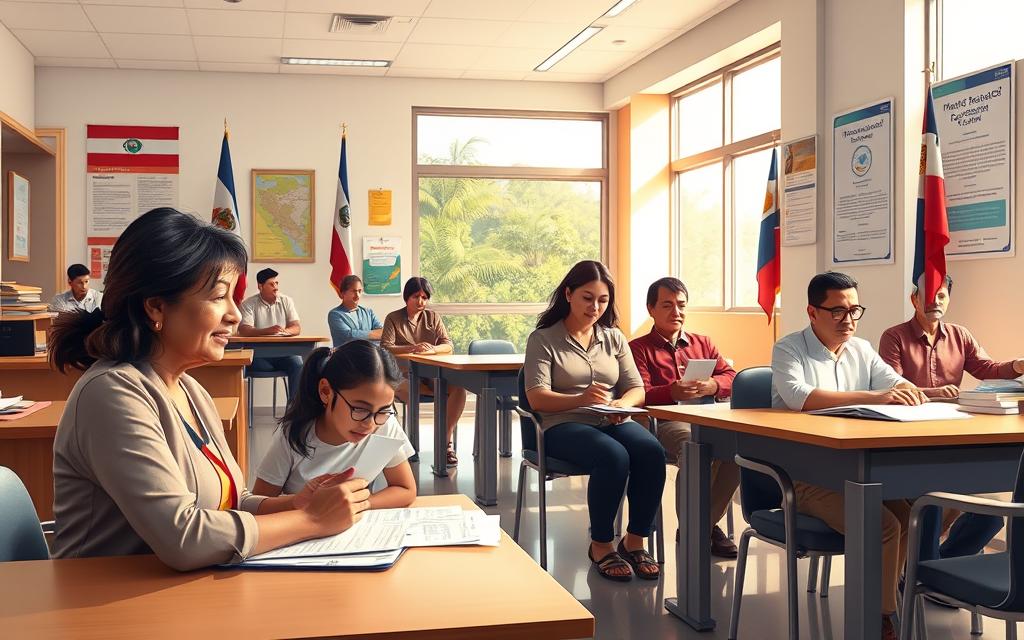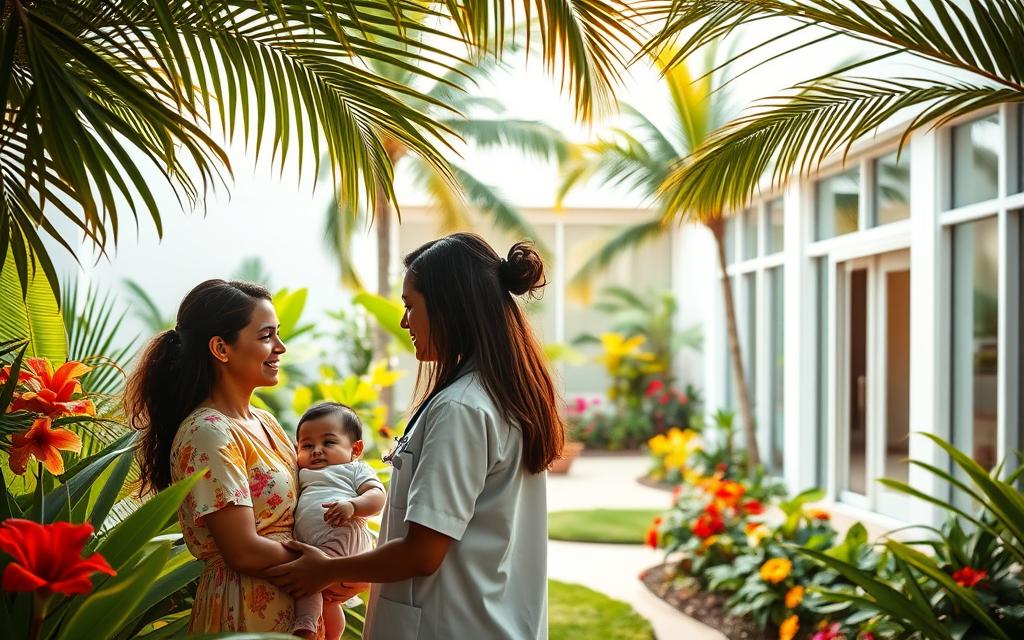Discover the best cities in Costa Rica for digital nomads with our ultimate guide. Learn how to live and work in paradise.

We Help Resident Families Access Healthcare in Costa Rica
Costa Rica’s healthcare system is renowned globally, ranking 36th in the world according to the World Health Organization, surpassing countries like the United States, Cuba, and New Zealand. This esteemed healthcare system is a significant draw for expats and retirees who value comprehensive, affordable care.
Costa Rica Immigration Experts (CRIE) has been instrumental in helping families achieve their dream of living in Costa Rica, with over 20 years of experience and thousands of successful residencies. The country’s dual healthcare structure, combining a universal public system (CAJA) with an extensive network of private facilities, offers flexibility and quality care.
Understanding the connection between residency status and healthcare access is crucial. CRIE specializes in guiding families through the residency process, the first step to securing legal access to Costa Rica’s healthcare system.
The Costa Rican Healthcare System: A World-Class Model

The healthcare system in Costa Rica is characterized by its universal public coverage and extensive private options. This blend allows residents to access high-quality medical care through various channels.
Public Healthcare: The CAJA System Explained
The Caja Costarricense de Seguro Social (CAJA) is the backbone of Costa Rica’s public healthcare system. Established in the 1940s, CAJA provides comprehensive coverage for citizens and legal residents, including medical procedures, appointments, hospital visits, and prescription medications. The system is funded through income-based monthly contributions, typically ranging from 7% to 11% of declared income. With a network of 29 hospitals and over 250 clinics across the country, CAJA ensures that quality healthcare is accessible to all residents.
Private Healthcare Options and Facilities
Costa Rica’s private healthcare sector offers high-end facilities and services, often at a lower cost compared to top North American hospitals. Prestigious facilities like CIMA Hospital, Clínica Bíblica, and Hospital La Católica provide top-notch medical care. Many Costa Rican doctors work in both the public and private systems, practicing at CAJA facilities in the mornings and private clinics in the afternoons. This integration ensures seamless care for patients who choose to use both public and private healthcare services. Private facilities typically offer shorter wait times and more personalized attention, making them attractive to expatriate families.
Residency Status and Healthcare Access for Resident Families in Costa Rica
Gaining residency in Costa Rica is a crucial step for families seeking to access the country’s renowned healthcare system. To qualify for healthcare, families must navigate one of the available residency programs.
Types of Residency Programs That Qualify for Healthcare
Costa Rica offers several residency pathways that qualify individuals for healthcare access, including the Pensionado, Rentista, and Inversionista programs. The Pensionado program is designed for retirees with a stable pension income of at least $1,000 per month. The Rentista program requires a $60,000 deposit into a CD, providing $2,500/month in income over two years. The Inversionista program necessitates a minimum $150,000 investment in Costa Rica, which can include real estate purchases. For more information on residency programs, especially for parents, you can visit https://crie.cr/residency-for-parents-in-costa-rica/.
The Connection Between Residency and CAJA Enrollment
The process of obtaining residency and enrolling in the CAJA (Caja Costarricense de Seguro Social) public healthcare system are linked but distinct. Once an individual receives their “resolution” document, indicating approval for residence, they must enroll in CAJA before receiving their official cédula (residency card). This enrollment involves an interview to determine monthly contribution amounts based on income.
The key points to consider are:
– Obtaining legal residency is the first step to accessing Costa Rica’s healthcare.
– Residency programs like Pensionado, Rentista, and Inversionista qualify individuals for healthcare.
– The residency application process takes 12-18 months, during which private insurance is recommended.
– CAJA enrollment is mandatory before receiving the cédula.
Understanding the CAJA Enrollment Process

Navigating the CAJA enrollment process is a crucial step for resident families in Costa Rica to access the country’s renowned healthcare system. The process begins after receiving residency approval and involves several key steps.
Required Documentation and Application Steps
To enroll in CAJA, applicants must gather specific documentation, including their residency resolution, passport, marriage certificate (if applicable), and proof of income. The first step is to pay enrollment fees, approximately $160, at a designated bank. Then, they proceed to their local CAJA office with receipts and required documentation for an interview with a case officer.
During the interview, the case officer determines the monthly premium based on the applicant’s declared income, using a sliding scale that ranges from 5.18% for incomes under $1,000 to 10.69% for incomes over $3,000. For more information on the CAJA system, you can visit https://crie.cr/costa-rica-social-security-caja/.
Family Coverage and Dependent Registration
One of the significant benefits of the CAJA system is its family coverage policy. One premium covers both the primary applicant and their spouse or partner, regardless of marital status or sexual orientation. Additionally, dependent children under 18 (or up to 25 if they are studying) are automatically covered without additional premiums.
Upon enrollment, families receive CAJA identification cards, which are essential for accessing public healthcare services throughout Costa Rica. After completing the CAJA enrollment and making the first payment, applicants receive a receipt that allows them to finalize their residency process and obtain their cédula (residency card) at the local post office.
Healthcare Costs and Monthly Contributions
Healthcare costs in Costa Rica are very reasonable, with medical services typically costing one-quarter to one-third of comparable services in the United States. This affordability is a significant factor in Costa Rica’s popularity as a destination for medical tourism.
Income-Based Contribution Structure
The CAJA contribution structure is income-based, meaning that the percentage of monthly income contributed to the healthcare system varies according to income level. For instance, individuals with a monthly income under $1,000 contribute approximately 5.18%, while those with incomes over $3,000 contribute around 10.69%. This structure makes healthcare proportionally affordable across different income levels.
During the CAJA enrollment process, applicants have the opportunity to declare deductions for certain expenses, such as insurance premiums, food, and existing medical costs. These deductions can potentially reduce the net income calculation used to determine the monthly premium, making the system more flexible and considerate of individual circumstances.
- One CAJA contribution covers both the primary applicant and their spouse or partner.
- No additional costs are incurred for dependent children.
- This makes CAJA an economical option for families residing in Costa Rica.
Comparing Public vs. Private Healthcare Costs
In Costa Rica, both public and private healthcare options are available, each with its own cost structure. The public healthcare system, managed by CAJA, offers affordable healthcare services to enrolled individuals. In contrast, private healthcare facilities charge out-of-pocket or through private insurance.
Private healthcare costs in Costa Rica remain relatively affordable, with average costs for doctor visits ranging from $60 to $75, and specialist consultations around $100. Diagnostic tests such as ultrasounds, x-rays, and blood work are generally under $100.
Many resident families in Costa Rica adopt a hybrid approach to healthcare, utilizing CAJA services for routine care and medications while opting for private services when faster attention is required. This flexibility allows families to balance cost and quality of care effectively.
Quality of Medical Care in Costa Rica
Costa Rica’s healthcare system has gained international recognition for its exceptional quality and accessibility. The country’s commitment to providing high-quality medical care is evident in its global rankings and patient satisfaction rates.
Global Rankings and Patient Satisfaction
Costa Rica is ranked 36th in the world by the World Health Organization, surpassing countries like the United States, Cuba, and New Zealand. The United Nations also places Costa Rica’s healthcare system within the top 20 globally. Patient satisfaction rates are exceptionally high among both locals and expatriates, with many reporting that the quality of care meets or exceeds their expectations.
- Costa Rica’s healthcare system is recognized globally for its high standards.
- Patient satisfaction rates are high among locals and expatriates alike.
Medical Facilities and Technology Standards
The country’s private hospitals, such as CIMA Hospital and Clínica Bíblica, feature state-of-the-art technology and internationally recognized accreditations like Joint Commission International certification. Public hospitals also maintain high standards of care and are continually being upgraded with government investment in infrastructure and equipment.
Costa Rica’s focus on preventive care and public health initiatives has contributed to the country having one of the highest life expectancies in the Americas, further validating the quality of its healthcare system.
Family Health Services and Maternity Care

Costa Rica’s healthcare system is renowned for its comprehensive family health services and maternity care. The country offers a range of healthcare options that cater to the needs of families, with a special emphasis on maternal and child health programs.
Prenatal, Delivery, and Postnatal Services
Pregnant women in Costa Rica receive preferential status in the CAJA system, enjoying minimal wait times for specialist appointments and comprehensive prenatal care. Maternity services include a full spectrum of care from prenatal through delivery and postnatal support, with both public and private facilities offering professional obstetric services. For more information on the public and private healthcare options in Costa Rica, you can visit this link.
Pediatric Care and Children’s Health Programs
All babies born in Costa Rica are automatically covered under the CAJA system for their first year of life, regardless of their parents’ residency status. The country’s pediatric care programs include comprehensive vaccination schedules, regular developmental check-ups, and specialized services for children with specific health needs. Costa Rica’s EBAIS program extends family health services to rural areas, ensuring that families throughout the country have access to preventive care and basic medical services.
Accessing Specialists and Emergency Services

Expats in Costa Rica can access high-quality specialist care through both public and private healthcare systems. The country offers a robust network of medical specialists in various fields, including cardiology, orthopedics, dermatology, and oncology.
Finding the Right Medical Specialists
Finding the right specialist often involves a referral from a primary care physician in the CAJA system or direct appointment scheduling at private facilities like CIMA Hospital or Clínica Bíblica. Many specialists in Costa Rica have received international training and speak English, particularly those practicing in private hospitals in the Central Valley region around San José.
Wait times for specialist appointments vary significantly between public and private sectors. CAJA appointments may take weeks or months, while private specialists can often be seen within days. Many resident families adopt a hybrid approach to specialist care, using CAJA for routine visits but paying out-of-pocket for private specialists when more immediate attention is needed.
Emergency Care Protocols and Availability
Emergency services are available 24/7 at both public and private hospitals throughout Costa Rica. Public facilities are legally required to treat all emergency cases regardless of insurance status. Private hospitals like Hospital Metropolitano offer dedicated emergency departments with shorter wait times and often more comfortable facilities than public hospitals.
For families living outside major urban centers, specialist access may require travel to San José or regional hospitals, though the country’s EBAIS program helps bridge gaps in rural healthcare access.
Private Insurance Options for Enhanced Coverage
Expat families in Costa Rica often explore private insurance options to ensure comprehensive healthcare coverage tailored to their needs. While the public CAJA system provides a solid foundation, private insurance can offer additional benefits such as shorter wait times, access to private facilities, and enhanced services.
Popular Insurance Plans for Expat Families
Many resident families in Costa Rica choose to supplement their mandatory CAJA coverage with private insurance plans. Popular options include international plans from providers like Cigna Global, which offer worldwide coverage, including Costa Rica’s private healthcare network. The Instituto Nacional de Seguros (INS), Costa Rica’s government-owned insurance company, also offers private medical insurance plans specifically designed for residents.
Combining Public and Private Healthcare Benefits
Combining CAJA with private insurance creates a comprehensive healthcare strategy that many expats find ideal. This approach allows families to use public services for routine care and medications while having private coverage for emergencies and specialist care. When selecting private insurance, families should consider factors such as hospital networks, prescription coverage, emergency evacuation benefits, and whether pre-existing conditions are covered.
Conclusion: Securing Quality Healthcare for Your Family in Costa Rica
The combination of universal public coverage and high-quality private healthcare options makes Costa Rica an attractive destination for families seeking quality medical care. Costa Rica offers resident families one of the most comprehensive and affordable healthcare systems in the Americas.
Securing proper residency status is the first step towards accessing this exceptional healthcare system. Costa Rica Immigration Experts has guided thousands of families through this process over the past two decades, ensuring they can enroll in the CAJA system and benefit from the country’s healthcare services.
Many expatriate families find that Costa Rica’s healthcare system exceeds their expectations in terms of quality, accessibility, and cost-effectiveness compared to their home countries. The flexibility to combine public and private healthcare options gives resident families control over their medical care, allowing them to choose services that meet their specific needs.
Costa Rica’s emphasis on preventive care and public health initiatives contributes to the country’s impressive health statistics, making it an ideal environment for raising healthy families. For families with specific healthcare concerns, Costa Rica Immigration Experts can provide personalized guidance on selecting the residency pathway that best aligns with their healthcare needs and budget.
To begin your journey toward securing quality healthcare for your family in Costa Rica, contact Costa Rica Immigration Experts today for a personalized consultation. With over 20 years of experience and thousands of successful residencies, they stand ready to help your family navigate the path to comprehensive healthcare access through proper residency status.
Please call or WhatsApp for a personalized consultation: +506 8706-3888, +506 8373-2085, or for calls from the USA or Canada: +1 305-906-6784. You can also visit their website at www.crie.cr or email info@crie.cr for more information.


